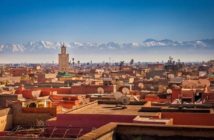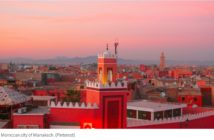
Orange caps identified “legal” protesters outside the Parliament building in Rabat, Morocco. But another time, many were not wearing them.
JOHN MACDONALD-Freelance
We never thought much about what would happen to us in case of a natural or human-caused disaster.
But after an unnerving experience in Morocco, we started rethinking our travel-safety checklist: Have we packed the first-aid kit? Are the meds past their pull dates? Do we have the sunscreen?
That May trip to Morocco and a tip from a travel nurse caused us to add “let the feds know where you’ll be” to our checklist.
Most days during our two-week stay in Morocco’s capital city of Rabat, we walked past the Parliament building to get to the train station.
We‘d stop to check out the organized (and peaceful) demonstrations — people urging better education programs or energy policies, that sort of thing. Participants usually wore colored vests or caps to show their involvement; it also helped authorities keep tabs on them.
But one morning as we walked in the park across the street, we saw a “protest” crowd spark suddenly into a mob, with young men shouting angrily and throwing things at the police, who seemed to appear from out of nowhere in full riot gear.
We didn’t see any of the bright orange ball caps or brown vests we had seen before on “legal” scheduled demonstrators.
The spectacle was unfolding swiftly in Moroccan Arabic, not English, and we had no idea what was going on. But it was apparent we needed to get out of there. Pronto.
We started trotting in a direction that seemed safer. A few young men trotted alongside us down side streets, furtively nursing cuts and scrapes apparently from police batons. And we passed police vehicles, waiting with fresh officers to enter the fray if needed.
A couple of blocks farther on, all was quiet. We spent the next hour in a museum and took a different route back to our hotel.
Looking back, we know that if we had been better aware of a security program offered American tourists and expats by the U.S. State Department we might not have gone anywhere near the Parliament building that morning.
The program was mentioned to us by our daughter-in-law, Debby Riehl, who was working with us on a trip this summer to Machu Picchu. A travel nurse in Washington state, she had checked to see what inoculations might be in order before the trip and strongly suggested we sign up with the State Department’s STEP (Smart Traveler Enrollment Program) service.
It works like this: You sign up online, telling the State Department where you’re going, when, where you’re staying while there, and who will be traveling with you. Then if there’s a natural disaster, medical emergency or sudden insurgence, the embassy in the country you’re visiting can contact you with up-to-the-minute news or emergency-evacuation procedures.
STEP is a recent iteration of a sign-up program the department has offered for years. The changes are a result of the Arab Spring revolutions in the Middle East, the 2011 earthquake and tsunami in Japan, and recent quakes in Chile that left Americans abroad suddenly and unexpectedly looking for a safe place to wait out the turmoil or a way to get back home.
“We’re certainly learning as we go,” said Hugo Rodriguez, division chief in the department’s Office of American Citizen Services and Crisis Management.
“Starting with the tsunami and earthquakes and particularly during the Arab Spring uprisings, we’ve been evolving.”
After the tsunami, cellphone coverage was out, Rodriguez said, but people still had access to Facebook and Twitter.
“That’s very useful for information about places where Americans are gathering, and information about ferries or charter flights where people might be taken out.”
It’s interesting that the social networks that many credit with helping Arab Spring rebels know when and where to gather should also be used to help Americans overseas get out of harm’s way.
Rodriguez’s office also has a free app available through iTunes to help instantly inform travelers with smartphones about dangers near the 250 embassies and consulates the U.S. has all over the world.
We ordered the app and looked up the information about Peru in anticipation of our trip to see the Inca ruins at Machu Picchu. There was information about how to get on the list of 2,500 people allowed to visit the historic site every day. And there was also a warning about the Shining Path terrorist group, which is still active in some rural provinces of Peru. The warning applies only to people planning to travel to remote areas, the department says, not cities or tourist areas like Machu Picchu.
Since we’ll be with a tour group, we should be fine.
But we could have used the app and the safety net of the STEP warnings in Morocco. If the State Department had had our itinerary, the embassy in Rabat might have sent a message warning us away from Parliament that morning.
It’s a good lesson for us.
And this may be a good time for you seniors who have not yet joined the social media world to jump in. If you’re intimidated by the notion of apps and Facebook and Twitter, call a grandkid or a neighbor teen over for pizza and have them help sign you up. It may open up a whole new world of travel fun. Apps can show you cafes and tourist spots and other helpful things, to say nothing of giving you peace of mind in case of an uprising or disaster.
.






